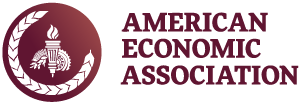We may still be in a period of disequilibrium in the conduct of the market for new economists, as Zoom interviews have replaced in-person interviews at the annual January ASSA meetings. In an attempt at maintaining market thickness, the AEA has reaffirmed its guidelines, as discussed in the email below that went out to AEA members yesterday
|
||||||
The AEA Executive Committee, in conjunction with its Committee on
the Job Market, recognizes that it is to the benefit of the profession if
the job market for economists is thick, with many employers and job
candidates participating in the same stages at the same time. Moreover, the
AEA's goals of diversity, equity, and inclusion are fostered by having a
timeline that remains widely known and accepted, ensuring that candidates can
correctly anticipate when each stage will occur. The AEA has a role to
establish professional norms, which includes ensuring fair treatment of job
candidates, including that they have enough time to consider job offers. With these goals in mind, and in light of inquiries from both job
candidates and employers about how to proceed, the AEA asks that departments
and other employers consider the following timeline for initial interviews
and “flyouts” in the upcoming job cycle (2024-25). Timing of interview
invitations
The AEA suggests that employers wait to extend interview invitations until
the day after job market signals are transmitted to employers (planned for
December 4). Rationale: the AEA created the signaling mechanism to reduce the problem
of asymmetric information and allow job candidates to credibly signal their
interest to two employers. The AEA asks that employers wait to extend
interview invitations until those signals have been transmitted, and to use
that information to finalize their set of candidates to interview. This helps
the job market in several ways: it reduces the problem of imperfect
information, it helps ensure a thick market at each stage, and it promotes
the AEA’s goals of diversity, equity, and inclusion. Job candidates from
historically under-represented groups may lack informal professional networks
and thus may especially rely on the signals to convey their interest. Waiting
to review the signals before issuing invitations promotes a fairer, more equitable
process. We also ask that all employers indicate on EconTrack when
they have extended interview invitations. This allows candidates to learn
about the status of searches without visiting websites posting crowd-sourced
information and potentially inappropriate other content. Timing of interviews
Initial interviews may take place any time after the AEA signals are sent
(planned for December 4). The AEA recommends that all initial interviews take
place virtually (e.g., by Zoom). We suggest that interviews not take place
during the ASSA meeting itself (January 3-5, 2025). Rationale: In the past, interviews were conducted in-person at the ASSA
meetings. This promoted thickness of the market, because most candidates and
employers were present at the meetings but had the disadvantage of precluding
both job candidates and interviewers from fully participating in sessions. Initial job interviews went online during COVID, and feedback indicated
that the benefits of virtual first-round interviews (e.g., low monetary cost,
zero cost in travel time, scheduling flexibility, convenience) outweighed the
limitations (e.g., less rich interaction). We ask that interviews NOT take place during the ASSA meetings (January
3-5, 2025) in order to allow job candidates and interviewers to participate
in the conference. Timing of flyouts
Flyouts have historically happened at times appropriate for the employer,
and the AEA sees no reason to suggest otherwise. We ask that all employers indicate
on EconTrack
when they have extended flyout invitations. Unlike with interviews, the AEA
does not take a position on whether flyouts should be virtual or in-person. Timing of offers and
“exploding” offers
In order to ensure that the job market remains sufficiently synchronized
and thick, and that candidates have a chance to compare offers, the AEA
recommends that employers leave job offers open (i.e. do not require
candidates to accept or decline) until at least January 31. The AEA also strongly recommends that employers give candidates at least
two weeks to consider their job offer. We recognize that offers made late in
the job market season (e.g., March or later) may be of shorter duration. In
some circumstances, employers are under heavy pressure to give less time to
candidates for various reasons. If that is absolutely necessary, we recommend
that employers give candidates a minimum of one week to consider the offer,
and that candidates be given advance notice of this (e.g., at the flyout
stage) whenever possible. Rationale: Recently, there is concern about a rise in “exploding offers” –
i.e., offers for which candidates are given too few days to sufficiently
consider the offer and their alternatives. This can prevent candidates from
learning about their options or comparing offers, and at the extreme can be
coercive. Giving candidates two weeks (or, late in the job market season, at
least one week) to consider an offer is a reasonable standard. We also ask that all employers indicate on EconTrack when they have completed or closed their
search. Job market
institutions and mechanisms
Please keep in mind the various job market institutions and mechanisms
created by the AEA to improve the job market:
Thank you for helping to ensure a transparent and equitable job market for
new Ph.D. economists. |




No comments:
Post a Comment